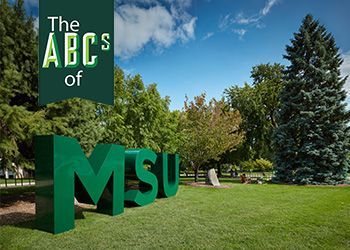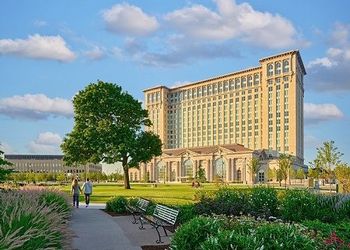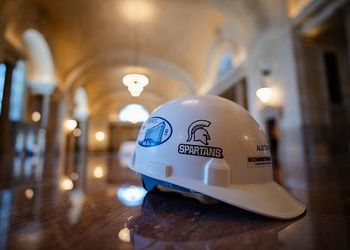Sports: Nick Saban's the Man

After an exhaustive search, MSU taps Nick Saban, a no-nonsense, proven winner in both college and professional football. When President Peter McPherson tapped Nick Saban as MSU's new football coach, Spartan enthusiasm ignited from coast to coast.
Saban, at 43, ranks among the hottest young prospects in football coaching today. But McPherson generated more than excitement. During the search process, which ended December 2--eight years to the day Saban's oldest child was born--he showcased his presidential style. It was impressive. He sought a vast range of expertise, and he resisted pressures from all sectors. He alone made the final decision. When he did, the outcome received overwhelming acclaim by both the media and alumni.
Many MSU leaders believe that McPherson's choice will, at last, unify all sectors of this university. To the extent that happens, his presidency will have scored one of its greatest triumphs to date. McPherson managed to stay in focus during the intensive search, even amid media speculation that reached Alice In Wonderland proportions, with rumor often replacing fact. Through all the clamor and pitfalls, McPherson stayed on course and applied a compelling rationale for his decision. He gave seven reasons for his pick, beginning with the fact that Saban, in his words, is 'tested and proven.'
Indeed, as the architect of MSU's 1988 Rose Bowl championship defense, and as the mastermind of the Cleveland Browns defense, the NFL's stingiest this year, Saban boasts a proven record of success in college and professional football-- as head coach and as assistant, both in recruiting and in coaching--that few can match.
A native of Fairmont, West Virginia, and graduate of Kent State, Saban has carved a stellar track record. After coaching at Kent State, West Virginia, Syracuse, Ohio State and Navy, he joined George Perles at MSU in 1983. His talent became evident, and Perles promptly named him defensive coordinator and top assistant. In five years, MSU improved from 2-9 to 9-2-1, winning the Big Ten and Rose Bowl titles. Under Saban's tutelage, MSU's defense earned the nickname 'Gang Green' for its bone-rattling hits and gang-tackling. In 1988, Saban joined the Houston Oilers (along with Lorenzo White and Greg Montgomery). In 1990 he became head coach of Toledo, leading the Rockets to a conference co-championship and a 9-2 record that came within five points of a perfect season. One year later, he joined Cleveland as defensive coordinator. The Browns defense, dead last in most categories, today tops the NFL in the most critical statistic, points allowed.
In explaining his rationale, McPherson also cited Saban's belief in the correlation between physical and academic effort, and his interest in coaching college students. Some onlookers had questioned whether Saban might use MSU as a stepping stone to the NFL. But Saban has a sound riposte. Had he really wanted an NFL job, he argues, he would have stayed with the Browns; after all, the last five NFL coaches named had been NFL defensive coordinators. 'Why I like college football,' Saban explains, 'is it gives you an opportunity to significantly affect people at a time in their life--from 18 to 21-- when it might make a difference.'
Moreover, Saban and his wife Terry were happiest while living in East Lansing, a wonderful community in which to raise Nicholas, 8, and Kristen, 4.
A fourth rationale, in McPherson's words: 'Nick knows MSU but at the same time has been gone long enough to provide for a fresh beginning--and this we must have.' McPherson also noted Saban's 'intense desire to succeed,' Saban's proven recruiting prowess, and, lastly, his 'great personal integrity.'
For his part, Saban, an intense, no-nonsense type of person, gave the media gathered Dec. 3 at Kellogg Center a preview of his style. He spoke directly, mincing no words, and often punctuated his points with hand thrusts. 'Would you say you're intense?' asked one journalist. 'I reckon,' he answered to laughter.
But rebuilding MSU's program is no laughing matter. As Saban sees it, 'The program needs to be reviewed from top to bottom.'
He stresses attitude, discipline and desire as fundamental qualities, along with technical football understanding. Saban plans to hire an aggressive recruiting staff to get what he calls 'character-quality people,' a phrase he reiterates.
Although he 'respects' George Perles, he intends to run his own program and will not enlist Perles' advice on football decisions. 'We want to try to establish the kind of winning program that Spartans everywhere can indentify with and be proud,' he says. 'We want to make sure that we give the student-athletes involved in our program the best opportunity to get an education so we can significantly improve the quality of their lives for years to come. And we would like to do it within the rules and regulations and compliance of the NCAA. 'To accomplish them, I think it's going to be critical that the University community come together. We have the kind of leader in President McPherson that we should rally around and move forward with.' Those are stirring words, indeed, but Nick Saban is a passionate and intense coach.
Former Spartan great and All-Pro Carl Banks, now with the Browns, calls Saban the best coach he ever had. Saban is MSU's 20th football coach in a program that will reach its century mark in two years. If he succeeds, he will carve his niche during a most opportune milestone in Spartan history.



